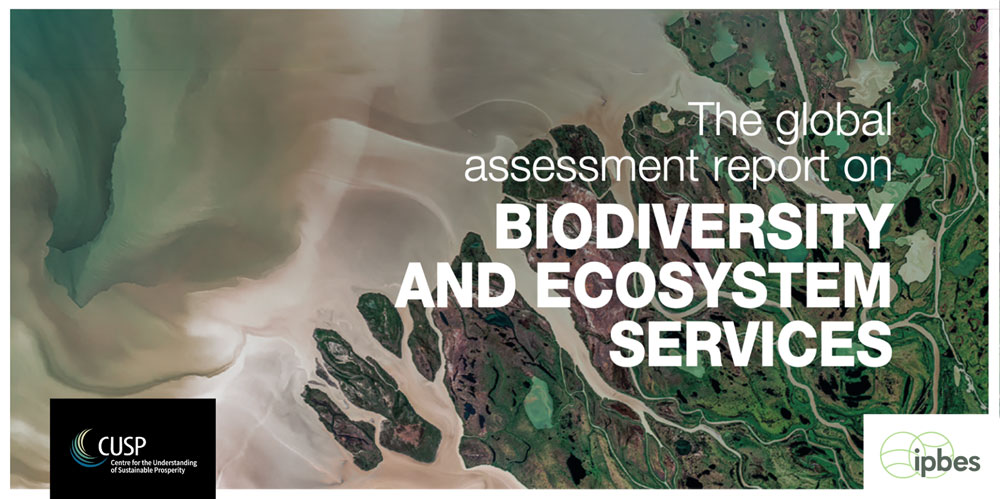Enabling transformative economic change in the post-2020 biodiversity agenda
Esther Turnhout, Pamela McElwee, Mireille Chiroleu-Assouline, Jennifer Clapp, Cindy Isenhour, Tim Jackson, Eszter Kelemen, Daniel C. Miller, Graciela M. Rusch, Joachim H. Spangenberg and Anthony Waldron
Conservation Letters. Journal of the Society for Conservation Biology | May 2021

Summary
The COVID-19 pandemic, its impact on the global economy, and current delays in the negotiation of the post-2020 global biodiversity agenda of the Convention on Biological Diversity heighten the urgency to build back better for biodiversity, sustainability, and well-being.
In 2019, the Intergovernmental Science-Policy Platform on Biodiversity and Ecosystem Services (IPBES) concluded that addressing biodiversity loss requires a transformative change of the global economic system.
Drawing on the IPBES findings, this policy perspective discusses actions in four priority areas to inform the post-2020 agenda: (1) Increasing funding for conservation; (2) redirecting incentives for sustainability; (3) creating an enabling regulatory environment; and (4) reforming metrics to assess biodiversity impacts and progress toward sustainable and just goals.
As the COVID-19 pandemic has made clear, and the negotiations for the post-2020 agenda have emphasised, governments are indispensable in guiding economic systems and must take an active role in transformations, along with businesses and civil society.
These key actors must work together to implement actions that combine short-term impacts with structural change to shift economic systems away from a fixation with growth toward human and ecological well-being. The four priority areas discussed here provide opportunities for the post-2020 agenda to do so.
Introduction
The COVID-19 pandemic has slowed discussions on the post-2020 biodiversity agenda, with the 15th Conference of the Parties (CoP) to the Convention on Biological Diversity now delayed to the end of 2021 [and 2022]. The current “zero draft” of the post-2020 global biodiversity framework (CBD, 2020a), which will be negotiated at the CoP, draws on the 2019 Intergovernmental Panel for Biodiversity and Ecosystem Services Global Assessment (IPBES, 2019) in recognising the importance of transformative change to safeguard nature and its contributions to people. For example, the draft notes that “urgent policy action globally, regionally, and nationally is required to transform economic, social and financial models so that the trends that have exacerbated biodiversity loss will stabilise in the next 10 years.” (CBD, 2020a, p. 2) Yet it remains vague with regard to how such transformations might be achieved. Moreover, although it identifies a number of goals and targets related to economics and biodiversity funding, it fails to specify a coherent strategy to transform underlying economic and financial systems and structures that drive the destruction of biodiversity (CBD, 2020a).
A specific, actionable strategy is urgently needed since the drivers of biodiversity loss have grown dramatically in the past decades and are only expected to increase in scope and intensity (IPBES, 2019). Our current economic system has achieved a quadrupling of global GDP over the past 50 years (Otero et al., 2020). However, this remarkable growth has come at the cost of widespread biodiversity loss and marked increases in greenhouse emissions (IPBES, 2019; Otero et al., 2020), while simultaneously generating a highly unequal distribution of benefits (Jackson, 2017). These changes threaten not only nature and human well-being but also future economic prosperity, leading the World Economic Forum to rank environmental and biodiversity degradation in the top five global economic risks today, even prior to the COVID-19 pandemic (WEF, 2020). The business community is increasingly recognising the threat posed by degradation of nature, including loss of pollinators, depleted water supplies, and increased risks of natural disasters.
The COVID-19 crisis provides further impetus to rethink the draft post-2020 biodiversity framework and prioritise strategic actions leading to transformative change in the way our economies and governance systems work. The COVID-19 crisis has shown in stark relief that financial and market tools, regulation, and voluntary measures must be used together, not separately. Governments have used financial stimuli to keep the economy from collapsing and to support those made jobless, and they have put in place regulations to spur behavioural change since voluntary actions, such as mask-wearing, alone proved to be insufficient. COVID-19 also clearly demonstrated how individual decision-making is structured by both government and market forces together, which affected among others the capacity of individuals to follow stay-at-home orders. Preventing potentially catastrophic outcomes from biodiversity loss will require the same approach: A recognition that the economy is the result of public institutions and the market working in tandem; that individual actions are embedded within these structural factors; and therefore, that promoting pro-biodiversity actions requires the transformation of those structural factors to create an appropriate enabling environment.
The integrated approach needed to improve biodiversity and climate outcomes will require radically changing the current imbalance between policies and market demands that promote biodiversity-damaging activities and those that promote biodiversity-conserving and enhancing activities. Yet, recognition of these critical interactions among governments, markets, and individuals–and related actions to address them–is largely absent in the current zero draft’s theory of change.
Here, we draw on the results of the IPBES global assessment to identify actions that can enable transformative change in national and global economic systems. We identify four priority areas for these actions: (1) Increasing capital investment in nature conservation and biodiversity-enhancing production; (2) redirecting economic incentives away from damaging activities and towards nature-enhancing actions; (3) creating enabling regulatory frameworks to ensure the effectiveness of increased investments and realigned incentives; and (4) reforming metrics to measure, value, and catalyse these transformative shifts and their impacts on human and ecological well-being. Although these four priority areas involve actions that have been proposed previously, we foreground the need for a more holistic strategy that combines concrete measures with structural changes. Profound transformative change will only be possible with the market, state, and civil society actors working together on these priority areas simultaneously.
The article is available in open access format via the Wiley website. If you have difficulties accessing the paper, please get in touch: info@cusp.ac.uk.
Citation
Turnhout Esther, McElwee Pamela, Chiroleu-Assouline Mireille, Clapp Jennifer, Isenhour Cindy, Kelemen Eszter, Jackson Tim, Miller Daniel C., Rusch Graciela M., Spangenberg Joachim H., Waldron Anthony. Enabling transformative economic change in the post-2020 biodiversity agenda. In: Conservation Letters. 2021; e12805. https://doi.org/10.1111/conl.12805



